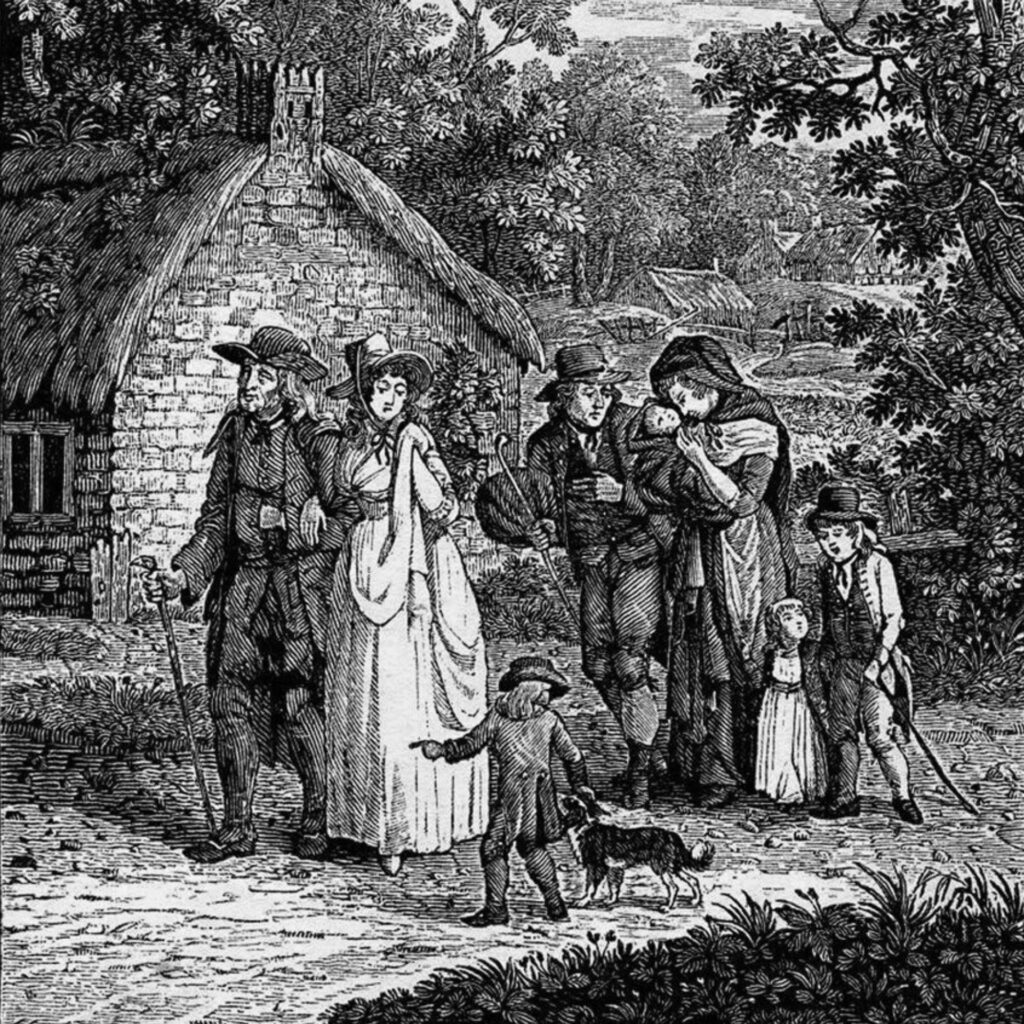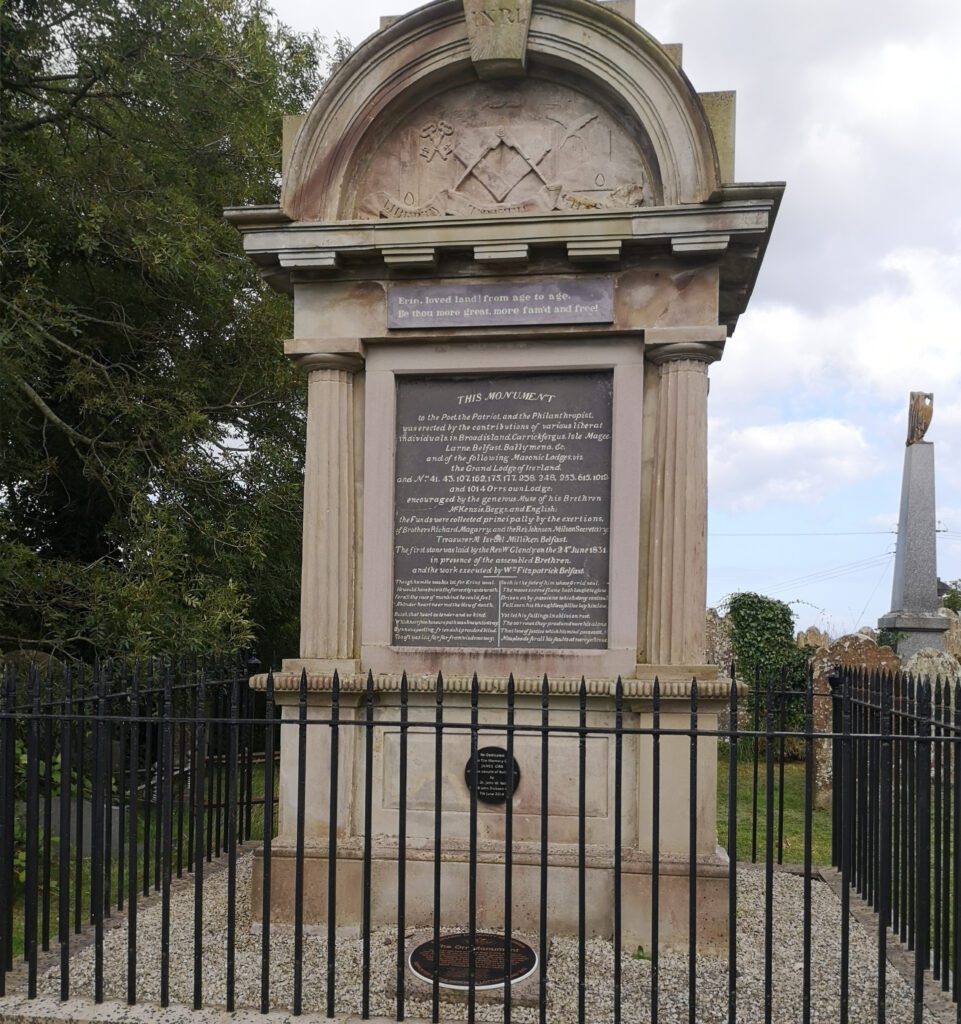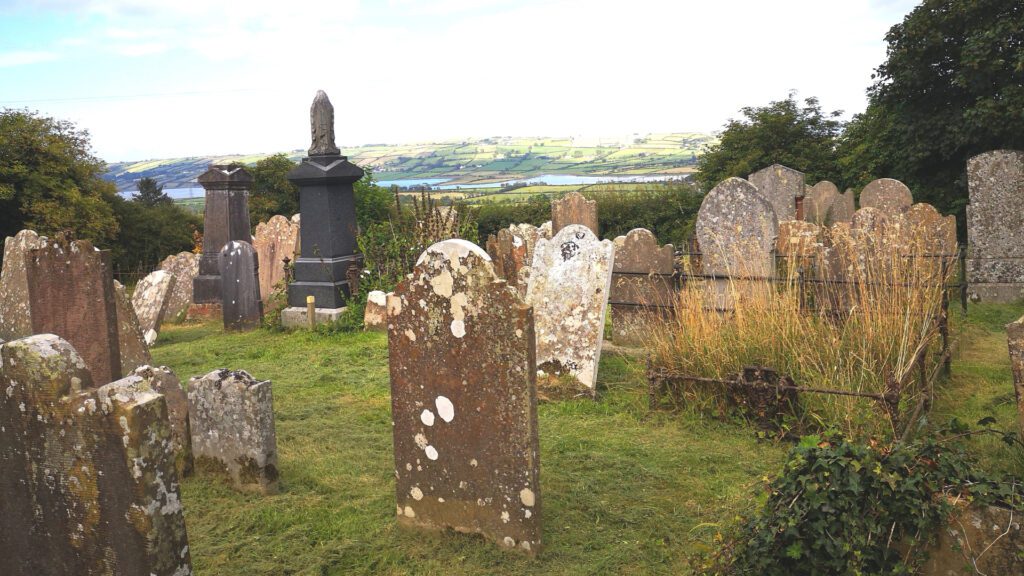Farewell to the long-loved shore: emigration in the Andrew Gibson Collection
by Linde Lunney
Andrew Gibson’s marvellous collection of Robert Burns and Burnsiana is a two-way, or even a three-way mirror. It reflects something of the collector, his background and his interests, and it reflects a view of the world within which Gibson lived. It also shows us something of the world within which a large number of Ulster poets experienced their lives.
Like Gibson’s own life, the collection bridges the North Channel—there are hundreds of items relating to the Scottish poets Robert Burns, Allan Ramsay, Robert Fergusson and others. Scottishness clearly mattered to Gibson. He was an enthusiastic participant in Scottish organisations in Belfast, but at the same time Gibson was also a well-known figure in local Ulster cultural and historical circles, and he painstakingly collected rare little books of verse, including many by poets who influenced those who had lived in the north of Ireland generations before Gibson arrived from Scotland in 1881.
Gibson was an emigrant, like many hundreds of thousands of Scots and Irish people who left and who are leaving their homelands to live and die in other countries. His life story reminds us that there are many kinds of lifetime movements, not just the archetypal emigrant ship to America and covered wagon stories which are what most people in Ulster nowadays would think was the typical emigrant experience. Scotland, like Ireland, was historically a country that people left, and it isn’t always remembered that as well as the significant numbers of migrants to Ireland in the 17th and 18th centuries, Scotland sent even more of its people to England and northern Europe, thousands upon thousands to countries such as Sweden and Poland.
Movement and living elsewhere was nothing new to the Scots of the 19th century either. Gibson was one of at least 12,000 Scots born people who were living in Belfast in the early 1900s; there were well over 34,000 in Ireland as a whole. They had no need for visas, moving within the United Kingdom, and had travelled only a short distance to a culturally similar city, where language, religion, climate, even food, would have been familiar, thanks to the prior emigrations of so many Scots two hundred years earlier. One might think that this hardly counts as emigration at all.

Shortly after Gibson and his family moved to Belfast, the town became a city, its population swollen by thousands of people moving from its rural hinterlands and from Great Britain to work in its industries and services. Historians and sociologists recognise that 18th and 19th century migrants like Gibson, as well as trans-national emigrants leaving familiar environments behind, were in many cases moving from pre- or proto-industrial societies. Such places can be characterised by sociologists as gemeinschaft communities, very different from the economically varied and more atomistic urban scenes within which most people today live. Was Gibson aware of how far he had travelled from Merkland farm, New Cumnock, Ayrshire, to Duncairn on the outskirts of a teeming industrial city?
It seems likely that Gibson responded very strongly to poetry which recorded rural life and traditional customs and probably also enjoyed reading the Scots language familiar to him from his birthplace. Attachment to home and to familiar landscapes is also a major theme in Ulster poetry, and it is significant that almost all the poets of this era wrote at least occasionally about emigration, which mattered so much to their worldview and their experience of life. Even more frequently, they composed poems which reveal their awareness of the changes happening in their environment, changes which often led to emigration.
Ulster poets who were alive in the years after 1800 and feature in the Linen Hall’s collections, like James Orr (1770-1816), from Ballycarry, County Antrim, had tasted of the fruit of the tree of knowledge (an appropriately Biblical metaphor). More sophisticated educationally than previous generations, and increasingly aware of the wider world through newspapers, literature and army and navy service, they seem to have realised that their place in the north of Ireland was different from other places, and that while it was unendingly fascinating to them, its values and way of life were under threat.
Orr and other poets recognised that the Ulster rural community was bound together by kinship, tradition, shared religion, shared experiences and local pride, as was typical of other gemeinschaft communities. Orr wrote about a Reading Society where he and his neighbours shared literature and debated politics and morality:
My sweet associates, kind in thought and looks
Who all my toils and pastimes share.
Orr may use the words ‘kind’ and ‘kindness’ with something of the significance of the root meanings of ‘kindred’, ‘related’. Certainly in the north of Ireland in Orr’s time and for generations afterward, both Protestant and Catholic neighbourhoods would have typically been marked by strong kinship ties of endogamous origin. In 1901, for instance, the townland of Fallagh Lower in Tyrone had 12 households of Clarke families out of 20 households.

Many people in rural areas in earlier centuries lived in clachans, which are clusters of settlement typical of the north of Ireland, as well as of parts of Scotland. According to the geographer Colin Thomas:
The whole ethos of the clachan was rooted in intertwined functioning kinship networks that permeated all facets of daily life and culture. Their essence was lack of distance between community members, who were genealogically, residentially and socially close to each other.
It is difficult for us today, living in a very different world, to realise what it was like for people in the past, immersed in the life of a small locality, able to assume that they were related to everyone they encountered, known to everyone at least by sight or by reputation. It is equally difficult for us today to understand what a dreadful wrench emigration would have been. People who decided to emigrate in the 18th and 19th centuries were in a very real sense deciding to die. They were deciding to accept the loss of their identity, by separating themselves from the place within which their identity had formed. All emigrants have to re-make a sense of personal identity, in a new place where no-one knows them.
The poets in the Linen Hall’s collections speak to us about their realisation of what emigration would mean. Orr emigrated after the failed rebellion of 1798, and as he thought about leaving Ireland he began to realise the losses that he would suffer:
My comrades kind, these long lov’d shores
No more we’ll roam on Sundays fine.
Prosperity and peace be yours!
To wander and to wail be mine
You’ll sometimes mind a friend far hence
Who shares the woes he did not earn
When parting was imminent, Orr visited neighbours to say goodbye:
An’ monie a house did call at
Shook han’s and smil’t; tho’ ilk fareweel
Strak, like a weighty mallet
Our hearts, that day.
The experiences of emigration, of the privations and terrors of the actual journey, have seldom been as vividly described as they are in Orr’s great poem ‘The Passengers’, and in his ‘Song Composed on the Banks of Newfoundland’. But Orr may not have lived away from home long enough to experience the worse traumas that some emigrants suffer; he was able to return to Ballycarry after a few months.
A great deal of research into the effects of emigration in present and past centuries, carried out by psychologists and sociologists, reveals what Orr, his contemporaries, and possibly also Andrew Gibson, might have experienced but probably could not have articulated. The ripping apart of the bonds of home and kinship may free an individual to seek new opportunities, to succeed economically, but this success inevitably costs something. The emigrant who left a place that meant everything, who now does not know deeply WHERE he or she is, cannot remember WHO he or she is; they must make new identities.
The self-made man, such a trope of the Victorian age and of autobiographical narratives involving emigration to America, someone like Andrew Gibson, can tot up his personal account of profit and loss of a lifetime. But the self-made man (or woman), and also many in our times, in politics and the media, forget to acknowledge the intangibles. The self-made person is not truly self-made. He or she was socialised, educated or trained, financed or equipped, and released by a sending community. The loss of hundreds of thousands of emigrants to a community is never costed either, not in financial terms, never mind in psychological or social ways. How much do all these people owe to their community of origin, but which they pay instead to their adopted country?

In the present day, the heritage industry and popular histories encourage us to take pride in the success stories of ‘our emigrants’. Fair enough, but we should also celebrate the society that formed them, and those who said goodbye to loved ones on Irish quaysides.
Andrew McKenzie (1780-1839), from Dunover near Ballywalter, County Down, is one of a number of poets in the Linen Hall’s collections who describe the loss and heartbreak of the sending community:
The hoary sire, with grief of heart
Cries ‘Why oh why did he depart?
Can he the natal dome, despise
And fly the groves he bade to rise.
Can he resign without one tear
The scenes to early mem’ry dear?
Or can he hope on earth to find
More faithful swains or friends more kind?
Dear son! Obey my earnest call
Return unto thy paternal hall
Then shall my sorrow disappear.
Thomas Given (1850-1917), from Cullybackey, County Antrim, wrote a long poem in the persona of a grieving mother:
Our weans were then wi’ us frae big tae the wee
The joy and delight o’ their daddy an’ me
Their noise and their laughter, diversion and sang
Made work tae us licht, as the time wore alang.
But as time stole awa’, tae us troubles came
Our boys tuck the notion o’ leein their hame
An’ pushin’ their fortune far ower the wave
Some o’ them succeeded, but some got a grave
Now yin by yin followed the pick an the wale
Yon stane in God’s acre can tell oot the tale.
Other poems too equate emigration with death. Every voyage in those more perilous times was potentially one from which the traveller would never return, but the American and Australian emigrants of the 19th century, unlike the travellers and merchants of earlier centuries, knew for sure in their heart of hearts that their voyage out of Ireland was the end of life as they had known it, and that henceforth they were dead to those whom they had loved. The emigrant was never going to go back home, and was unable to communicate with loved ones, just as if unable to speak from beyond the grave. It is hardly surprising that beliefs about heaven in the afterlife, as the 19th century went on, increasingly centred on the idea that heaven was a home where the family would be re-created, where everyone would at long last be together again.
Andrew Gibson may not have understood as historians and psychologists now understand, that his success in Belfast came at a price. The emigrant’s success must come at a cost, if not to him, then to his family; or to a place, his community of origin, impoverished by his departure.
Gibson was fortunate to have made his new life in a relatively similar culture only a four hour steamship journey away from his native land, and in a place where there were enough fellow Scots with whom he could form new connections in multiple organisations, keeping his sense of Scottishness alive. Late 19th century inventions, the telegraph, the postal system, photography, sweetened the bitterness of parting. But in his collecting of so many poetry books, whose authors wrote of lives that paralleled his own, we can perhaps see his affection for the same kind of rural life that he had journeyed away from in Scotland; an appreciation emulated in the creative responses of Ulster Scots to their place and to their experiences.
This article quotes from:
James Orr, ‘The Reading Society’, Collected Poems (1935, first published 1817), p. 274; ‘The Banks of Larne’, Collected Poems (1935, first published 1804), p. 69; ‘The Passengers’, Collected Poems (1935, first published 1804), p. 135.
Colin Thomas, ‘Distance, time and rural communities in Ireland’, in Rural Landscapes and Communities: Essays Presented to Desmond McCourt (1986), p. 154.
Andrew McKenzie, ‘The spirit of the grove’, Poems and Songs on Different Subjects (1810), p. 77.
Thomas Given, ‘My auld candlestick’, Poems from College and Country (1900).

Linde Lunney
Linde Lunney is from north Antrim. She studied in Edinburgh, and then was awarded a PhD by Queen’s University. Almost her whole career until retirement in 2018 was spent working in the Dictionary of Irish Biography in the Royal Irish Academy, Dublin, writing hundreds of biographies, and she also researches Ulster local history and genealogy.






